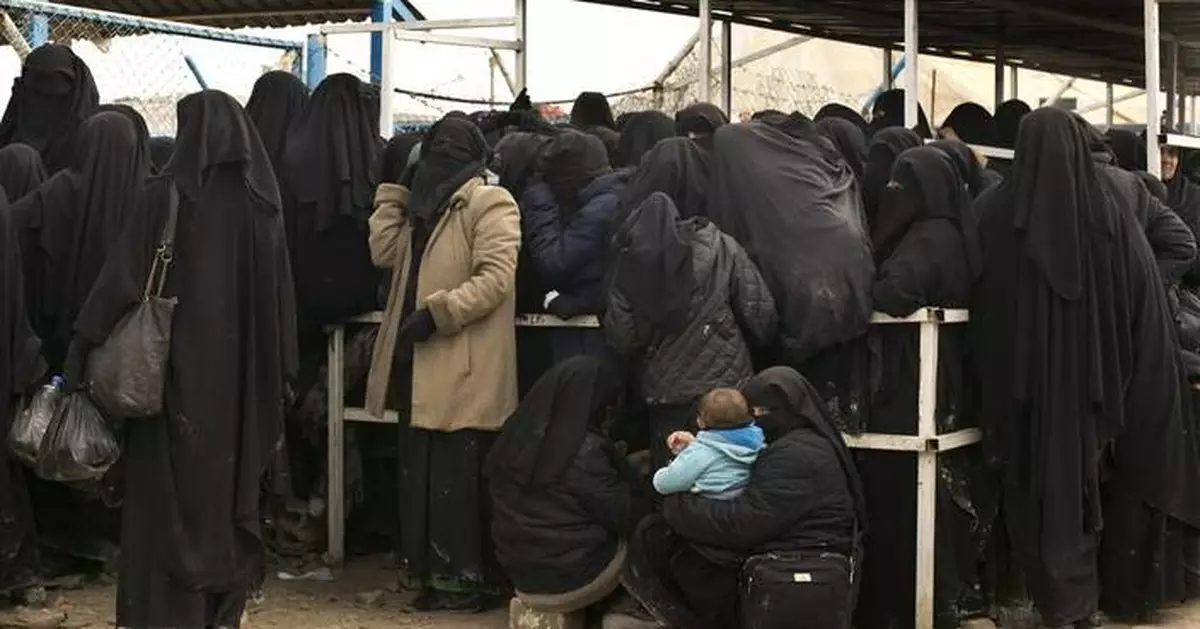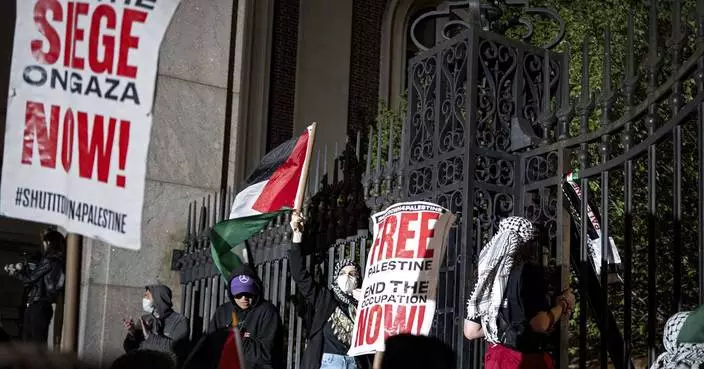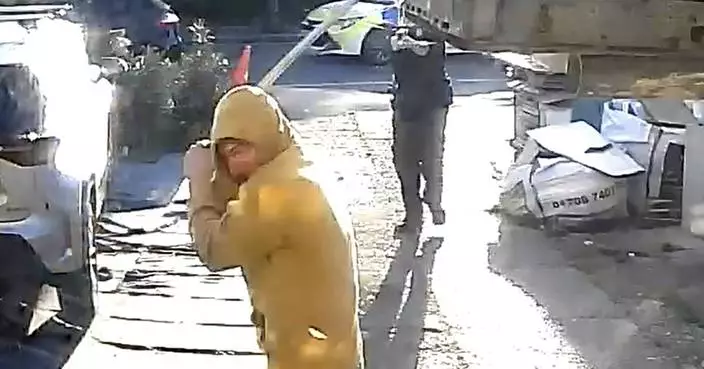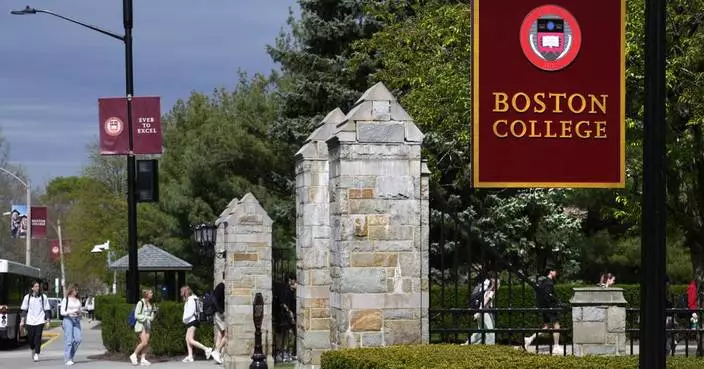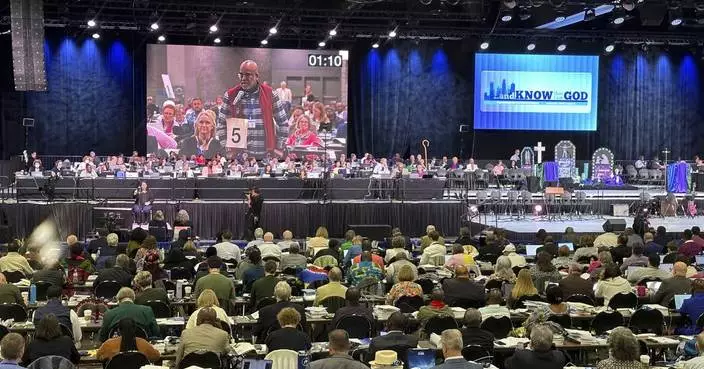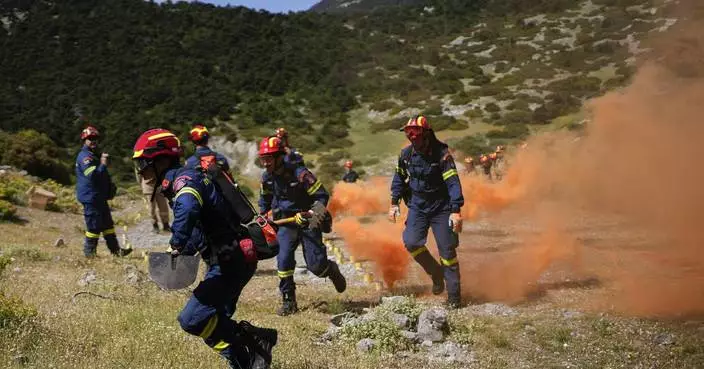BEIRUT (AP) — Amnesty International said Wednesday it has documented widespread abuses, including torture and deprivation of medical care, in detention facilities holding thousands of suspected Islamic State members and their relatives in northeast Syria.
The centers and camps hold about 56,000 people — the majority of them children and teens — and are run by local authorities affiliated with the U.S.-backed, Kurdish-led Syrian Democratic Forces. The SDF and its allies, including U.S.-led coalition forces, defeated the Islamic State group in Syria in 2019, ending its self-proclaimed Islamic “caliphate” that had ruled over a large swath of territory straddling Iraq and Syria.
What to do with the suspected IS fighters and their families has become an intractable issue. Many countries whose citizens traveled to Syria to join IS have been reluctant to repatriate them, as have local communities in Syria.
"People held in this system are facing large-scale violations of their rights, some of which amount to war crimes,” Nicolette Waldman, Amnesty’s senior crisis advisor, told journalists.
The United States is also responsible for the alleged violations because it played a key role in establishing and maintaining the detention system, providing hundreds of millions of dollars to the SDF and affiliated forces and regularly interrogating detainees, Waldman said.
The human rights group interviewed 126 people accused of IS affiliation currently or formerly detained, along with representatives of the local administration and aid workers.
The Amnesty report said the vast majority of detainees are being held “indefinitely, without charge or trial, in violation of international human rights law and international humanitarian law,” while those who have been tried were, in many cases, convicted on the basis of confessions extracted under torture.
The alleged abuses include “beating, stress positions, drowning, electric shocks and gender-based violence,” including a male detainee who said he and others had been sodomized with broomsticks by guards, the report said. Detainees were also deprived of food, water and medical care and subjected to extreme cold and heat in overcrowded cells, with some allegedly dying of suffocation, it said.
The report added that many of the approximately 14,500 women and 30,000 children held had been victims of human trafficking, including women who were forced to marry IS fighters and minors who were forcibly recruited by the group, and that local authorities had failed to set up a “mechanism to identify trafficking victims” and protect them.
The report also criticized the practice of forcibly separating adolescent boys — some as young as 11 or 12 — from their mothers and placing them in rehabilitation centers indefinitely.
Amnesty called on local authorities, the U.S. government and other allies to bring the detention system into compliance with international law and urged the United Nations to work with them to establish a screening process to release all who are not “reasonably suspected” of having committed a serious crime.
The Autonomous Authorities of the North and East Syria Region, the civilian administration affiliated with the SDF, wrote in response to the Amnesty findings that it had not received any official complaints regarding torture in detention facilities and “if this happened, they are individual acts.”
The administration said it would take action against employees who committed violations if evidence is provided. It denied allegations that inmates were deprived of food, water and medical care. It acknowledged overcrowding in the facilities, which it attributed to lack of financial resources to secure larger centers.
The local authorities took issue with the allegation that people were arbitrarily detained, asserting that most detainees “are members of a terrorist organization and were arrested during the battles" and that many had committed crimes against humanity and war crimes.
The U.S. State Department said in its own response that “we share many of (Amnesty’s) concerns” and it has been working to address them. It called on the international community to “aid local entities’ management of these challenges” and for countries with citizens held in detention in Syria to repatriate them.
Waldman said she believes Washington "very likely knew about these poor conditions from the beginning."
She added: “We think that it may not be the case that they are doing everything they can. They need to accept a much greater responsibility, especially since they played such a key role in establishing the situation in the first place."
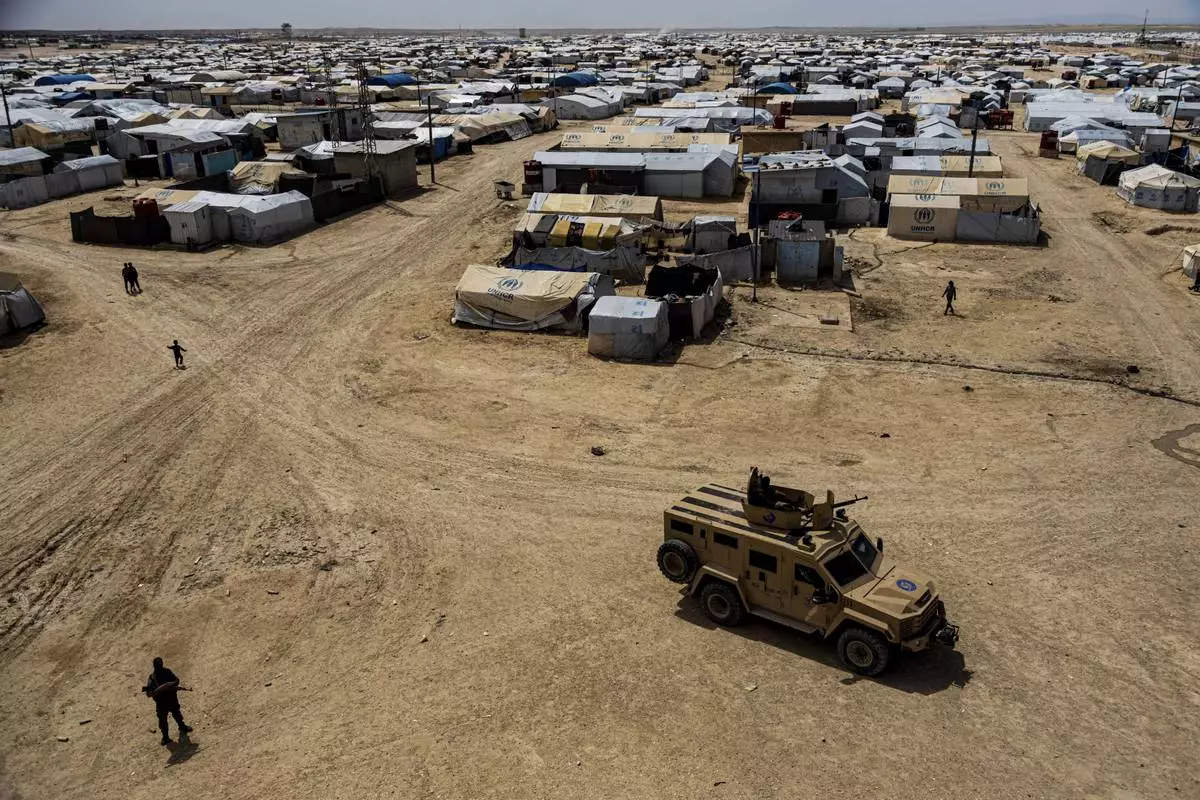
FILE - Kurdish forces patrol al-Hol camp, which houses families of members of the Islamic State group in Hasakeh province, Syria, on April 19, 2023. Amnesty International said Wednesday, April 17, 2024 it has documented widespread abuses, including torture and deprivation of medical care, in detention facilities holding thousands of suspected Islamic State members and their relatives in northeast Syria. (AP Photo/Baderkhan Ahmad, File)
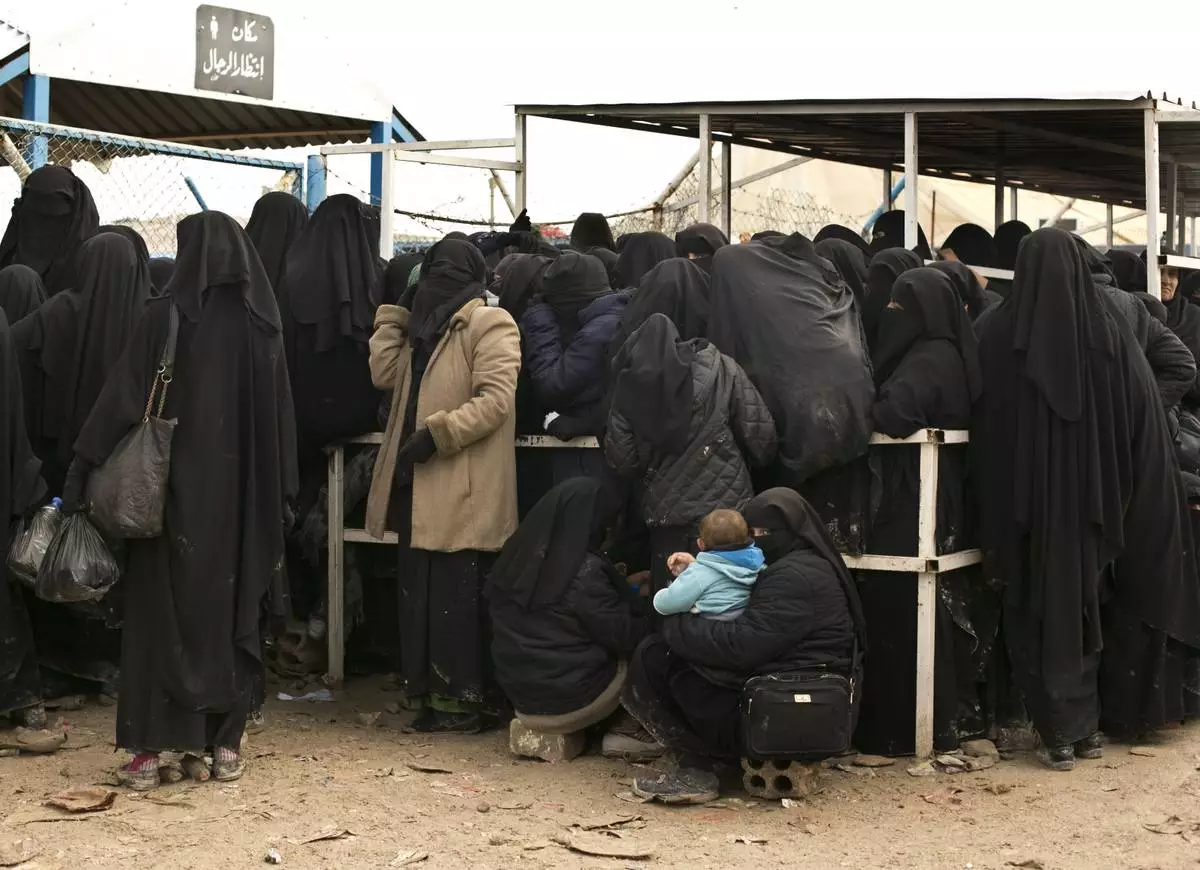
FILE - Women residents from former Islamic State-held areas in Syria line up for aid supplies at Al-Hol camp in Hassakeh province, Syria, March 31, 2019. Amnesty International said Wednesday, April 17, 2024 it has documented widespread abuses, including torture and deprivation of medical care, in detention facilities holding thousands of suspected Islamic State members and their relatives in northeast Syria. (AP Photo/Maya Alleruzzo, File)
JERUSALEM (AP) — U.S. Secretary of State Antony Blinken met with Israeli leaders Wednesday in his push for a cease-fire deal between Israel and Hamas, saying “the time is now” for an agreement that would free hostages and bring a pause in the nearly seven months of war in Gaza.
Blinken is on his seventh visit to the region since the war erupted in October, aiming to secure what’s been an elusive deal between Israel and Hamas that could avert an Israeli incursion into the southern Gaza town of Rafah, where some 1.4 million Palestinians are sheltering.
The current round of talks appears to be serious, but the sides remain far apart on one key issue — whether the war should end as part of an emerging deal.
Before agreeing to an initial, short-term cease-fire and partial hostage release, Hamas wants assurances that the eventual freeing of all the hostages will bring the end of Israel’s offensive and its full withdrawal from Gaza. Israel has offered only a pause after which it would resume its offensives until Hamas is destroyed. Israeli Prime Minister Benjamin Netanyahu repeated his determination to attack Rafah in talks with Blinken on Wednesday.
Blinken put pressure on Hamas, saying it would bear the blame for any failure to get a deal. Hamas said in a statement it would likely reply to the latest proposal on Thursday.
“We are determined to get a cease-fire that brings the hostages home and to get it now, and the only reason that that wouldn’t be achieved is because of Hamas,” Blinken told Israel’s ceremonial President Isaac Herzog at a meeting in Tel Aviv.
“There is a proposal on the table, and as we’ve said, no delays, no excuses. The time is now,” he said.
Blinken said the deal would also allow much needed food, medicine and water to get into Gaza, where the war has sparked a humanitarian crisis and displaced much of the territory’s population.
Still, Netanyahu's vow to carry out a military operation in Rafah, which Israel says is the last major Hamas stronghold showed the remaining challenges in the talks.
“The operation in Rafah doesn’t depend on anything. The prime minister made this clear to Secretary Blinken,” Netanyahu’s office said after the two met Wednesday. A day earlier, Netanyahu pledged to move on Rafah “with or without” a cease-fire deal.
The United States has staunchly supported Israel’s campaign of bombardment and ground offensives in Gaza since Hamas’ unprecedented attack on Oct. 7 into southern Israel. But it has grown increasingly critical of the staggering toll borne by Palestinian civilians and has been outspoken against an assault on Rafah, where more than half of Gaza's population of 2.3 million has packed in and around the town after fleeing fighting elsewhere in the territory.
Washington says it opposes a major offensive but that if Israel conducts one it must first evacuate civilians.
In Rafah, Palestinians terrified of a potential Israeli invasion clung to hope that, after months of reported near-deals, this time a cease-fire would be sealed. Hundreds of thousands are living in vast tent camps filling the once empty areas around Rafah
Salwa Abu Hatab, a woman who fled Khan Younis, said she wants to go home. “Do you think we like life in tents? We are tired and suffering,” she said. "Every day they say there is a truce and negotiations, and in the end it fails. We hope they will succeed this time."
“If the invasion happens, we do not know where to go," said Enas Syam, a woman from Gaza City carrying her child in the camp. “There is no safe place left.”
In his talks with Netanyahu, Blinken urged him to build on what he said has been the “improvement” in the delivery of aid to Gaza over the past month. Bowing to U.S. pressure to increase aid deliveries, Israel re-opened its Erez crossing into the northern Gaza Strip on Wednesday for the first time since it was damaged in Hamas’ Oct. 7 attack.
Throughout his regional visit, with previous stops in Saudi Arabia and Jordan, Blinken urged Hamas to accept the latest cease-fire proposal, calling it “extraordinarily generous” on Israel’s part.
The proposal — brokered by the U.S., Egypt and Qatar — would put a full Israeli withdrawal from Gaza up for discussion, according to leaked details confirmed by an Egyptian official and a Hamas official.
The proposal lays out three stages of six to seven weeks each with a detailed timetable of steps. The first phase would bring a pause during which Hamas would release some hostages, particularly civilian women, in exchange for the release of Palestinian prisoners in Israeli jails.
Israeli troops would withdraw from a coastal road in Gaza to facilitate passage of aid and the return of displaced people to the north, then the troops would withdraw from central Gaza. In the meantime, talks would start on restoring “a permanent calm,” the Egyptian official said, speaking on condition of anonymity to discuss the internal negotiations.
The next stage would bring implementation of the calm, including Hamas’ release of all remaining hostages – soldiers and civilians – and a withdrawal of Israeli forces out of Gaza.
The last stage would see the release of bodies of dead hostages and the start of a five-year reconstruction plan. The plan says that Hamas would agree not to rebuild its military arsenal. The details were first reported in the Lebanese newspaper Al-Akhbar, which is close to Hamas and the Lebanese Hezbollah militant group.
The Egyptian official said Hamas wanted the language of the second phase to be strengthened to specify a “complete Israeli withdrawal from the entire Gaza Strip” to avoid different interpretations. It also wants clearer terms for the unconditional return of displaced people to the north of Gaza, since the current outline didn’t fully explain who would be allowed back, the official said.
Meanwhile, Israeli airstrikes in Gaza continued. Late Tuesday, a strike hit a house in Rafah — where strikes have been continual despite the masses of Palestinians taking refuge there — killing at least two children, according to hospital authorities. An Associated Press journalist saw the children’s bodies at Abu Yousef al-Najjar hospital as their relatives mourned the deaths.
On Wednesday, Israel’s military said it was operating in central Gaza, where it said jets struck militants, including one said to be setting up explosives.
The Israel-Hamas war was sparked by the unprecedented Oct. 7 raid into southern Israel in which militants killed around 1,200 people, mostly civilians, and abducted around 250 hostages. Israel says the militants are still holding around 100 hostages and the remains of more than 30 others.
The war in Gaza has killed more than 34,000 Palestinians, according to local health officials. The war has driven around 80% of Gaza’s population of 2.3 million from their homes, caused vast destruction in several towns and cities and pushed northern Gaza to the brink of famine.
Magdy reported from Cairo and Mednick from Tel Aviv, Israel.
Follow AP’s coverage of the war at https://apnews.com/hub/israel-hamas-war
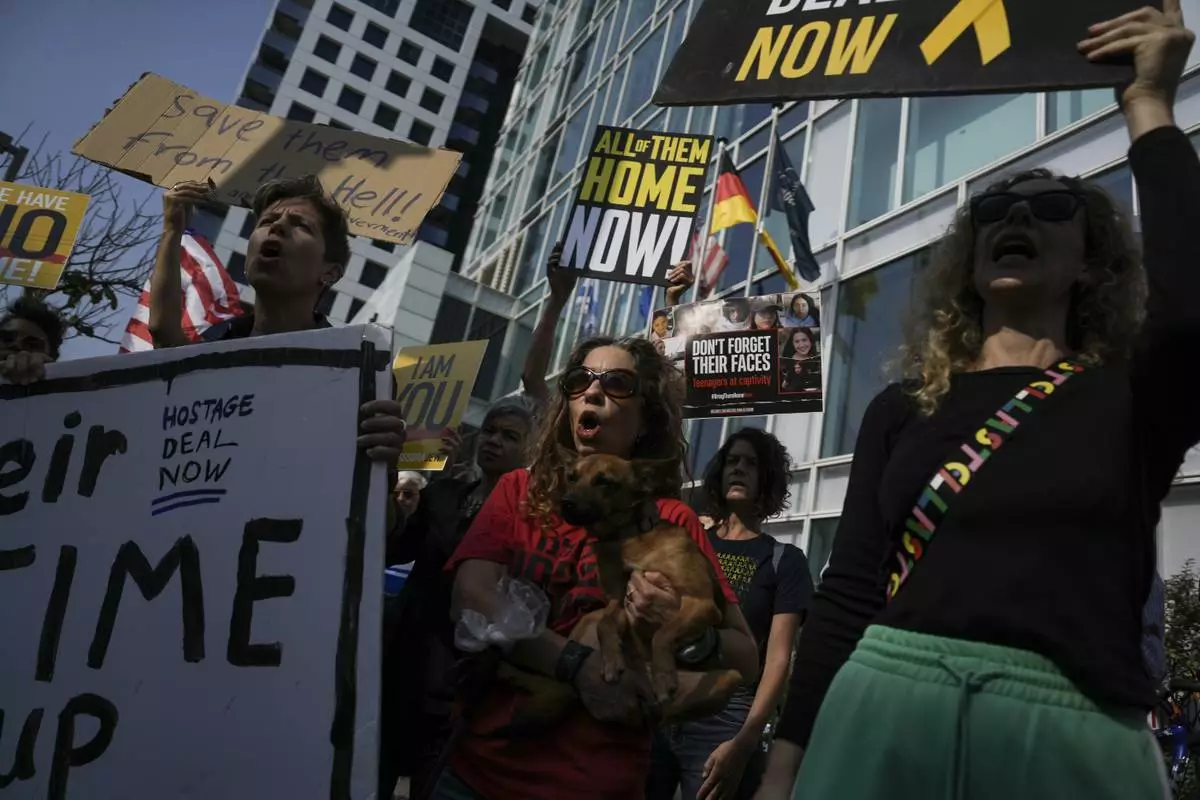
Families and supporters of Israeli hostages held by Hamas in Gaza hold banners and shut slogans during a protest calling for their return, outside a meeting between U.S. Secretary of State Antony Blinken and families of hostages in Tel Aviv, Wednesday, May 1, 2024. (AP Photo/Oded Balilty)
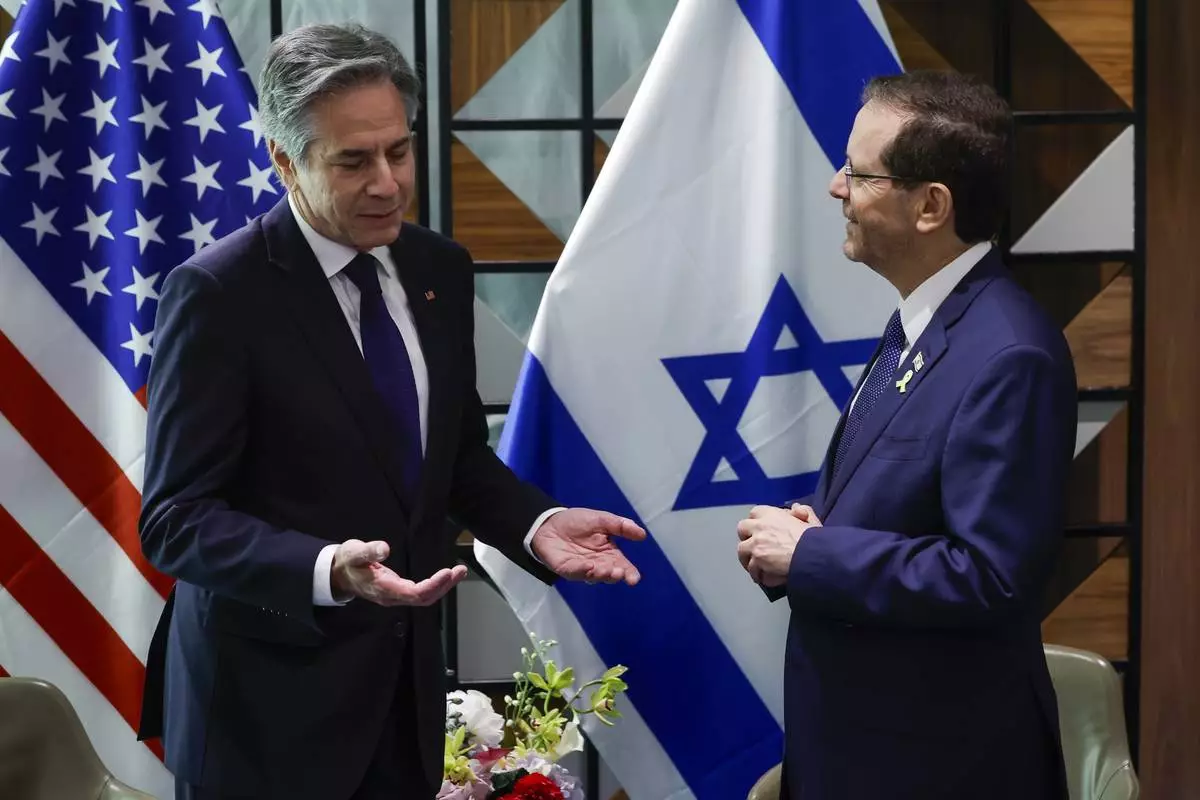
U.S. Secretary of State Antony Blinken, left, meets with Israeli President Isaac Herzog in Tel Aviv, Israel Wednesday, May 1, 2024. (Evelyn Hockstein/Pool Photo via AP)
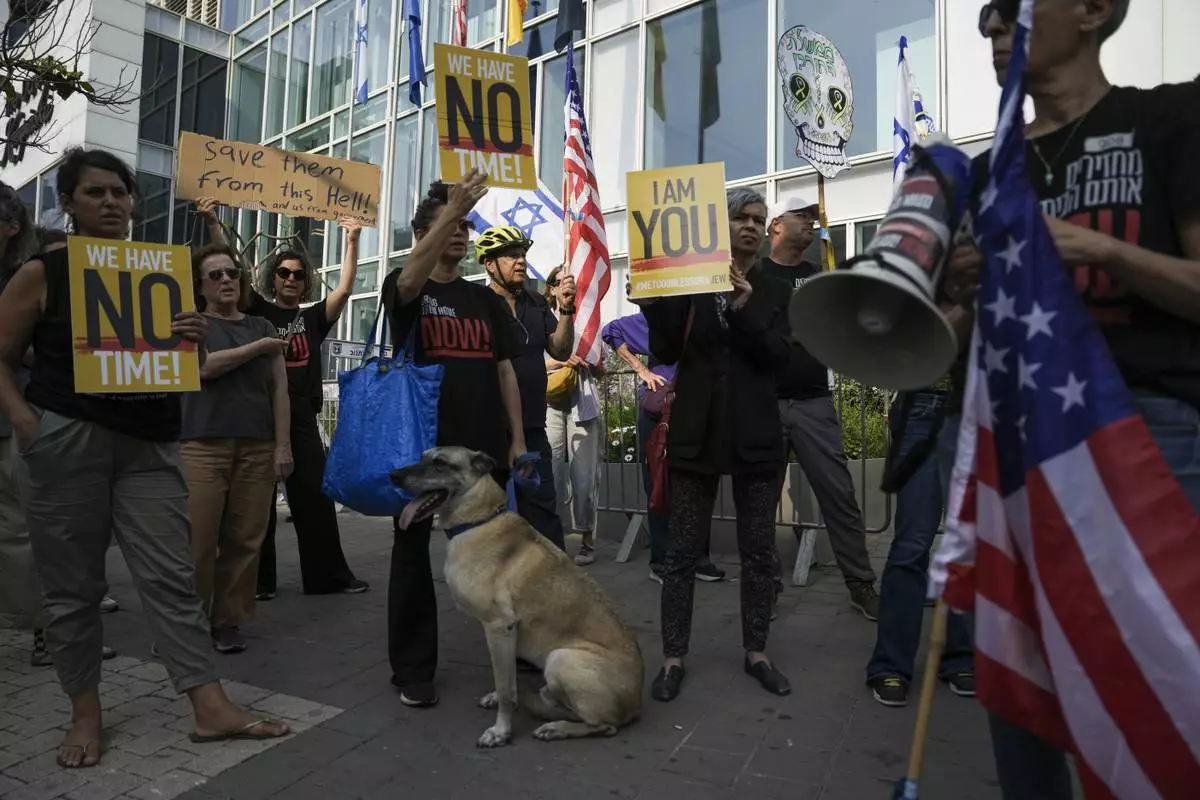
Families and supporters of Israeli hostages held by Hamas in Gaza hold banners and flags during a protest calling for their return, outside a meeting between U.S. Secretary of State Antony Blinken and families of hostages in Tel Aviv, Israel, Wednesday, May 1, 2024. (AP Photo/Oded Balilty)
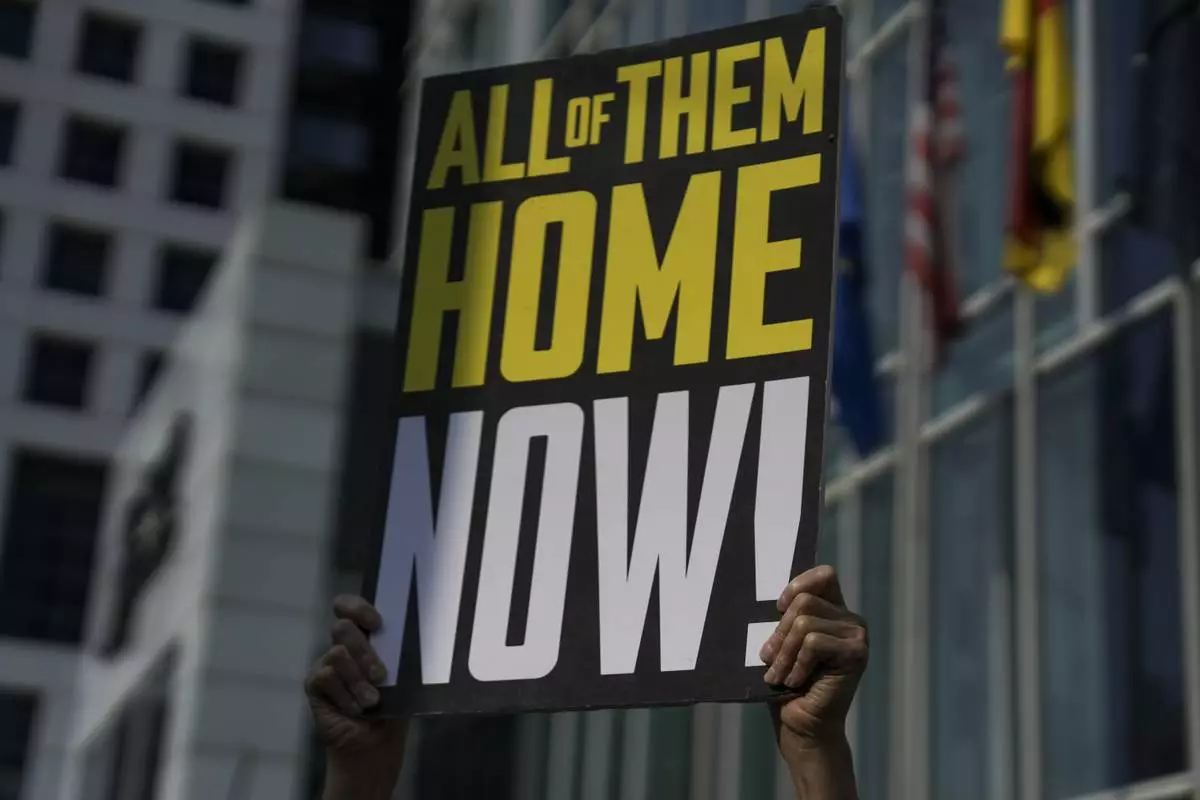
A woman holds a banner with families and supporters of Israeli hostages held by Hamas in Gaza during a protest calling for their return, outside a meeting between U.S. Secretary of State Antony Blinken and families of hostages in Tel Aviv, Israel, Wednesday, May 1, 2024. (AP Photo/Oded Balilty)
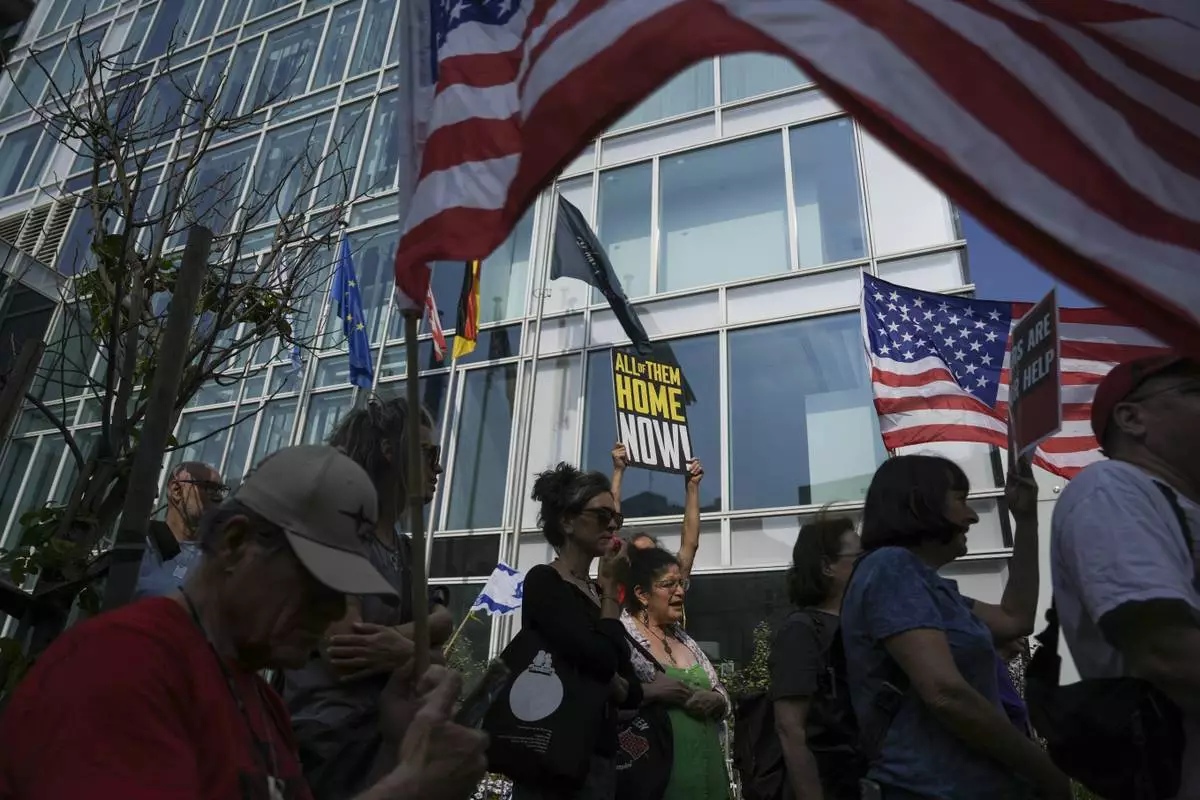
Families and supporters of Israeli hostages held by Hamas in Gaza hold banners and flags during a protest calling for their return, outside a meeting between U.S. Secretary of State Antony Blinken and families of hostages in Tel Aviv, Israel, Wednesday, May 1, 2024. (AP Photo/Oded Balilty)
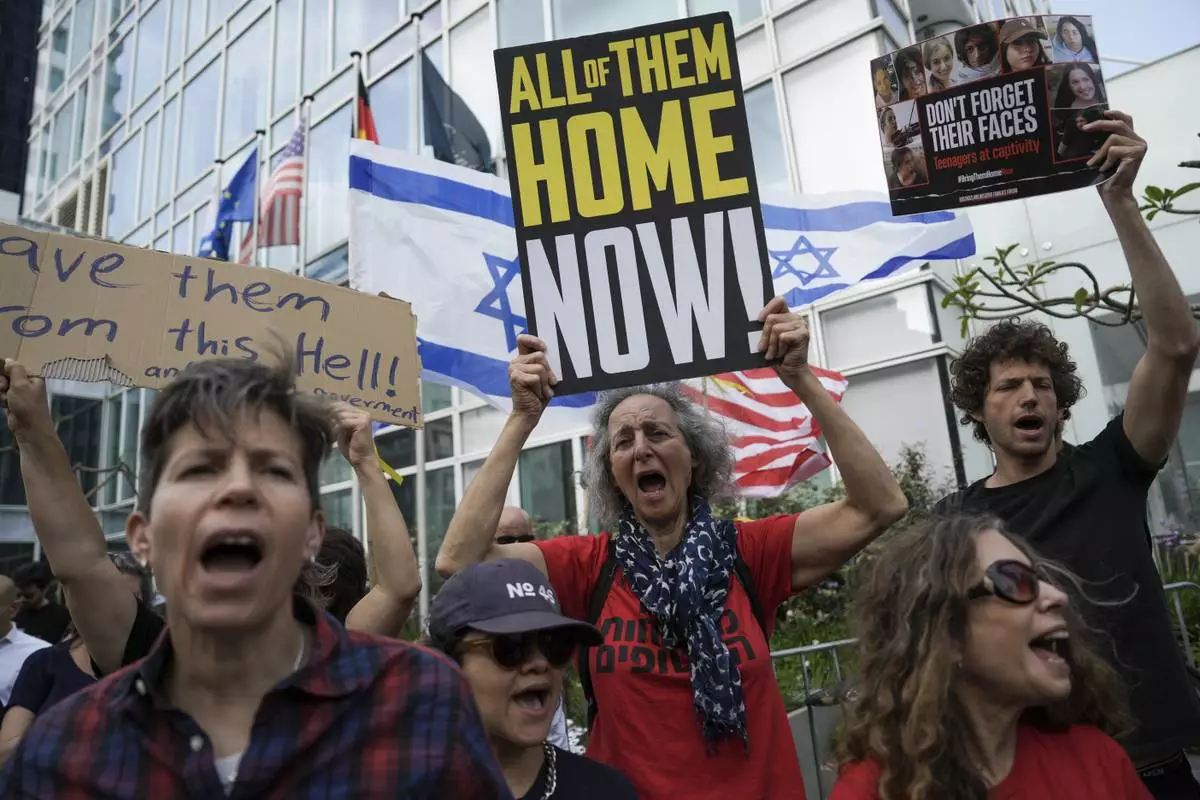
Families and supporters of Israeli hostages held by Hamas in Gaza hold banners and flags during a protest calling for their return, outside a meeting between U.S. Secretary of State Antony Blinken and families of hostages in Tel Aviv, Israel, Wednesday, May 1, 2024. (AP Photo/Oded Balilty)
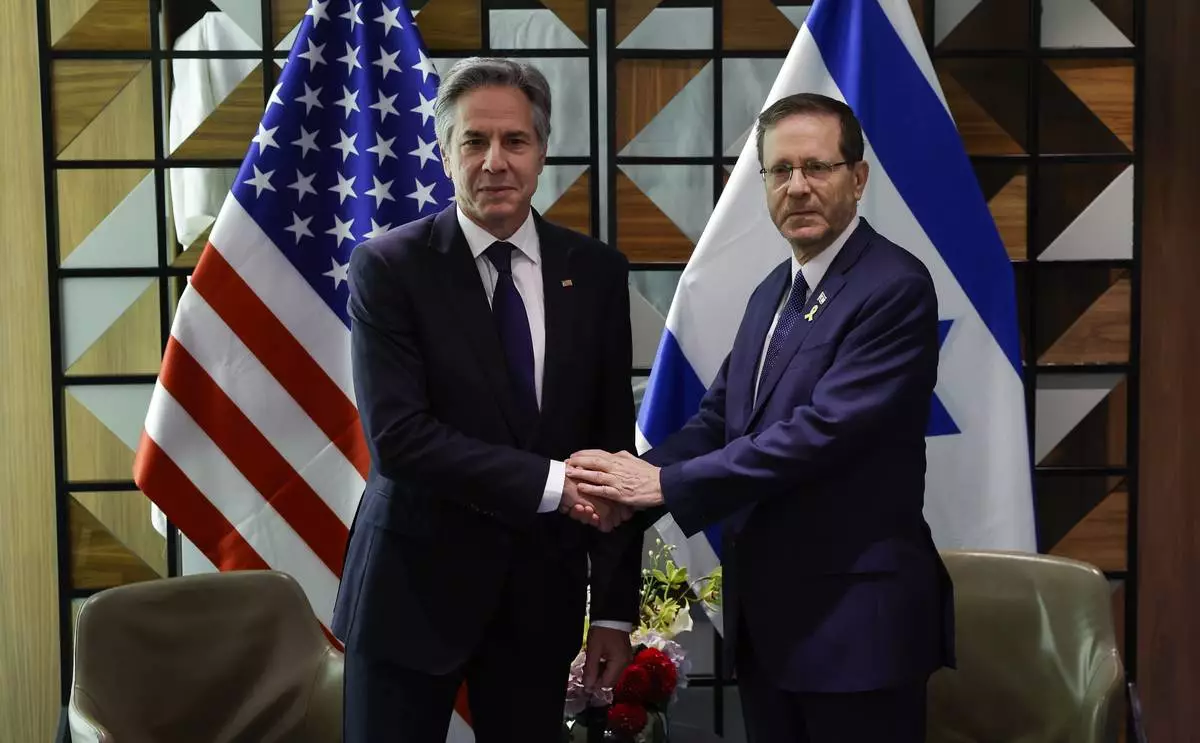
U.S. Secretary of State Antony Blinken, left, and Israeli President Isaac Herzog shake hands during their meeting in Tel Aviv, Israel Wednesday, May 1, 2024. (Evelyn Hockstein/Pool Photo via AP)
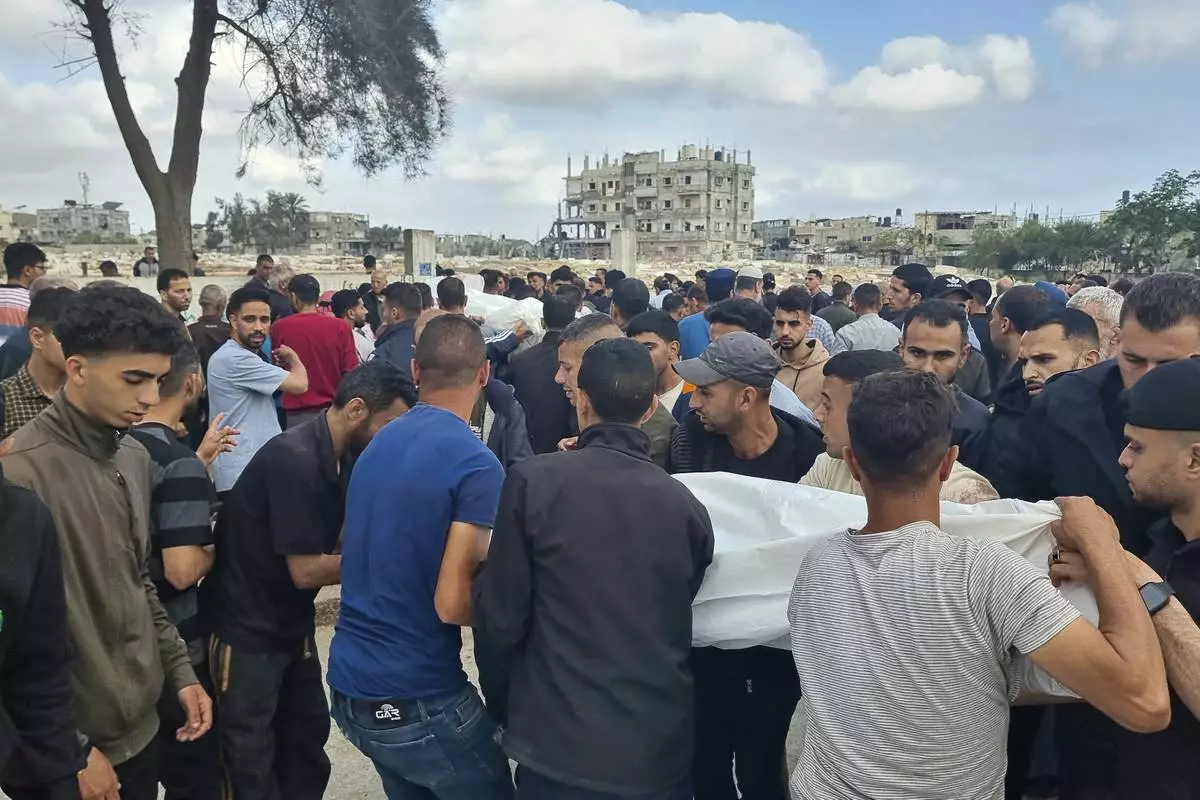
Mourners carry the bodies of members of the Abu Taha family who were killed in an Israeli airstrike, during their funeral at Al-Salam cemetery, east of Rafah, Gaza Strip. Monday, April 29, 2024. (AP Photo/Mohammad Jahjouh)
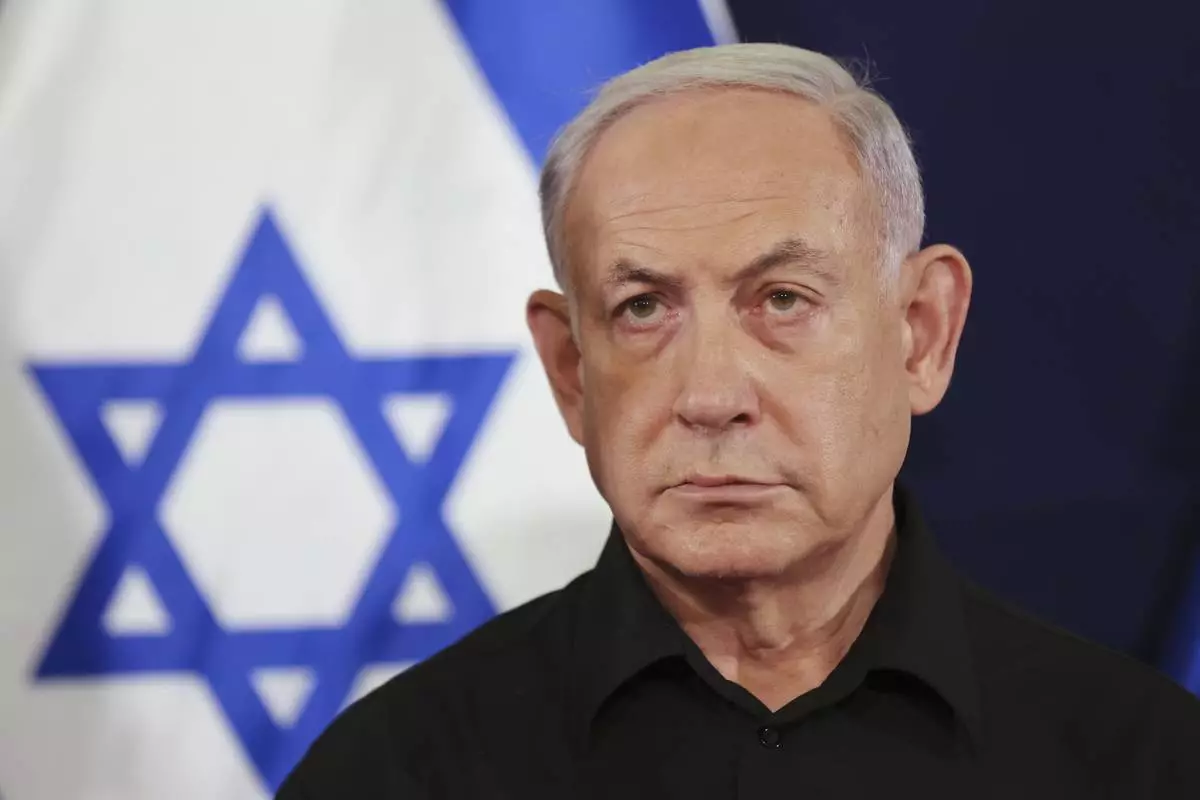
FILE - Israeli Prime Minister Benjamin Netanyahu attends a press conference in the Kirya military base in Tel Aviv, Israel on Oct. 28, 2023. Netanyahu pledged Tuesday, April 30 to launch an incursion into the southern Gaza city of Rafah, where hundreds of thousands of Palestinians are sheltering from the almost 7-month-long war, just as cease-fire negotiations between Israel and Hamas appear to be gaining steam. (Abir Sultan/Pool Photo via AP, File)
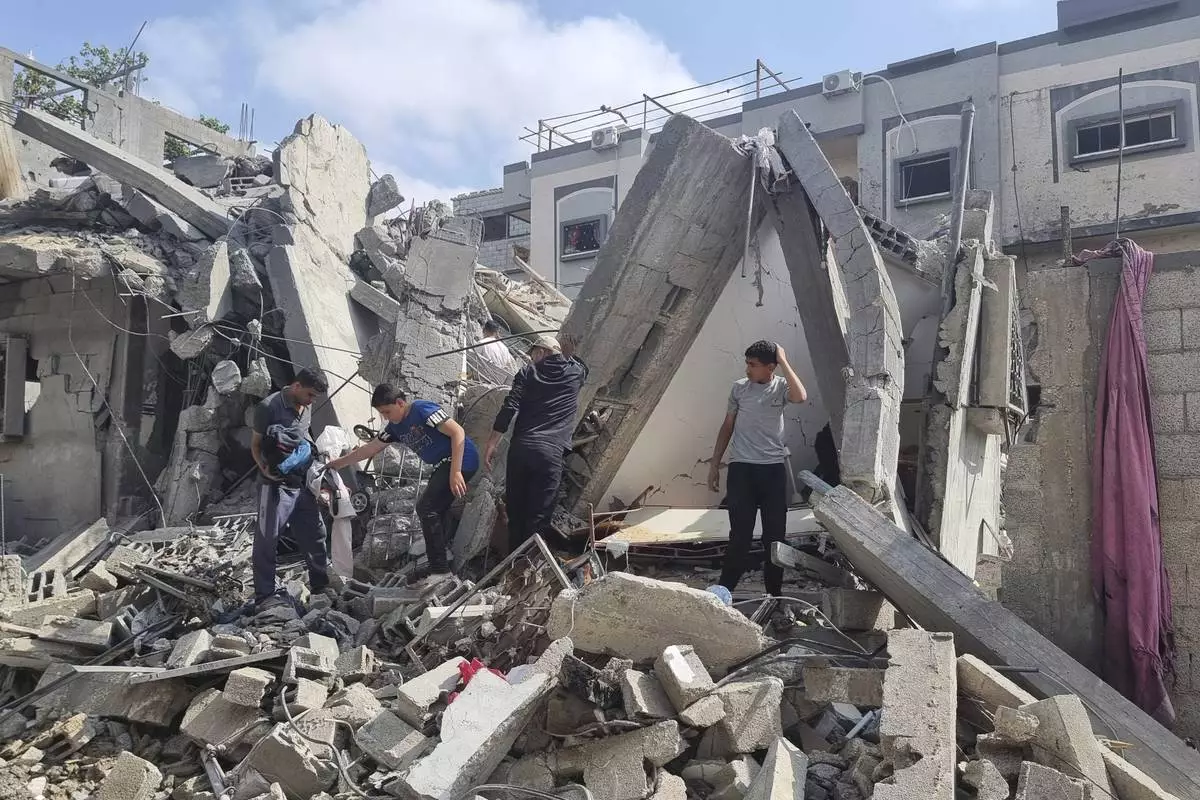
Palestinians look at the destruction after an Israeli airstrike in Rafah, Gaza Strip. Monday, April 29, 2024. (AP Photo/Mohammad Jahjouh)
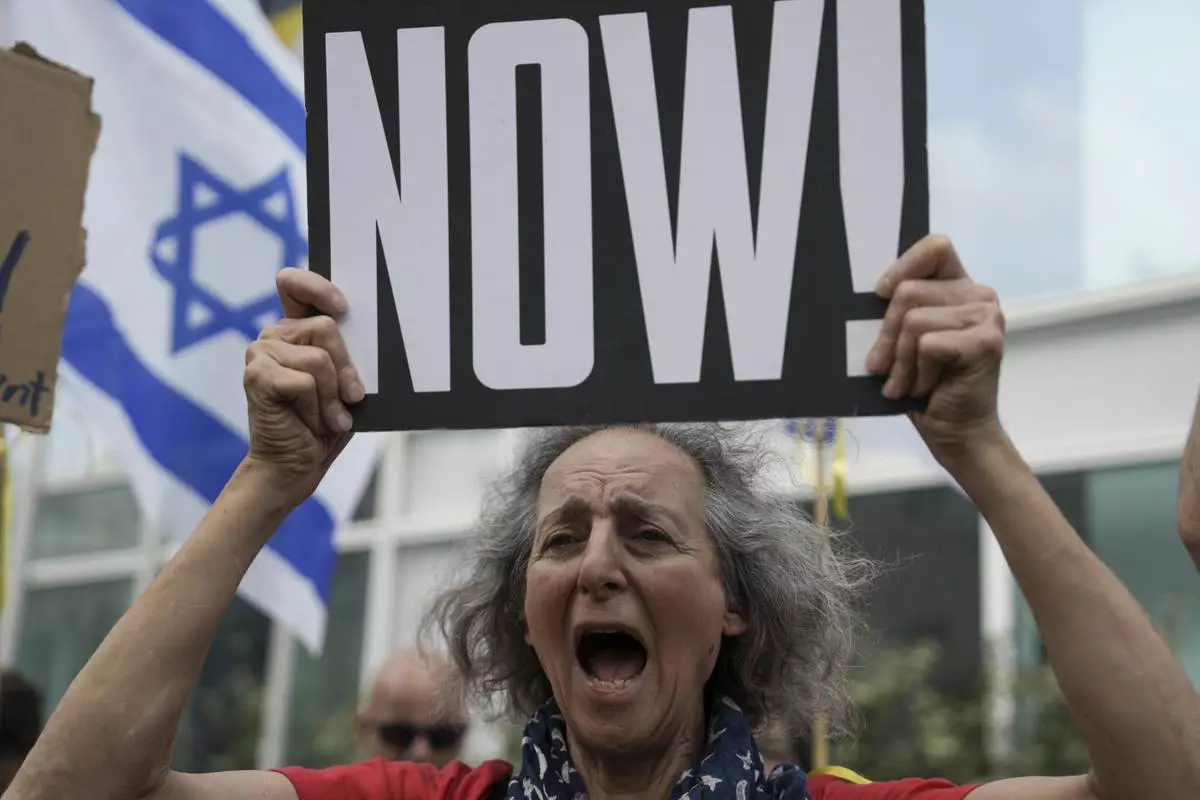
A woman holds a banner and shouts slogans with families and supporters of Israeli hostages held by Hamas in Gaza during a protest calling for their return, outside a meeting between U.S. Secretary of State Antony Blinken and families of hostages in Tel Aviv, Israel, Wednesday, May 1, 2024. (AP Photo/Oded Balilty)
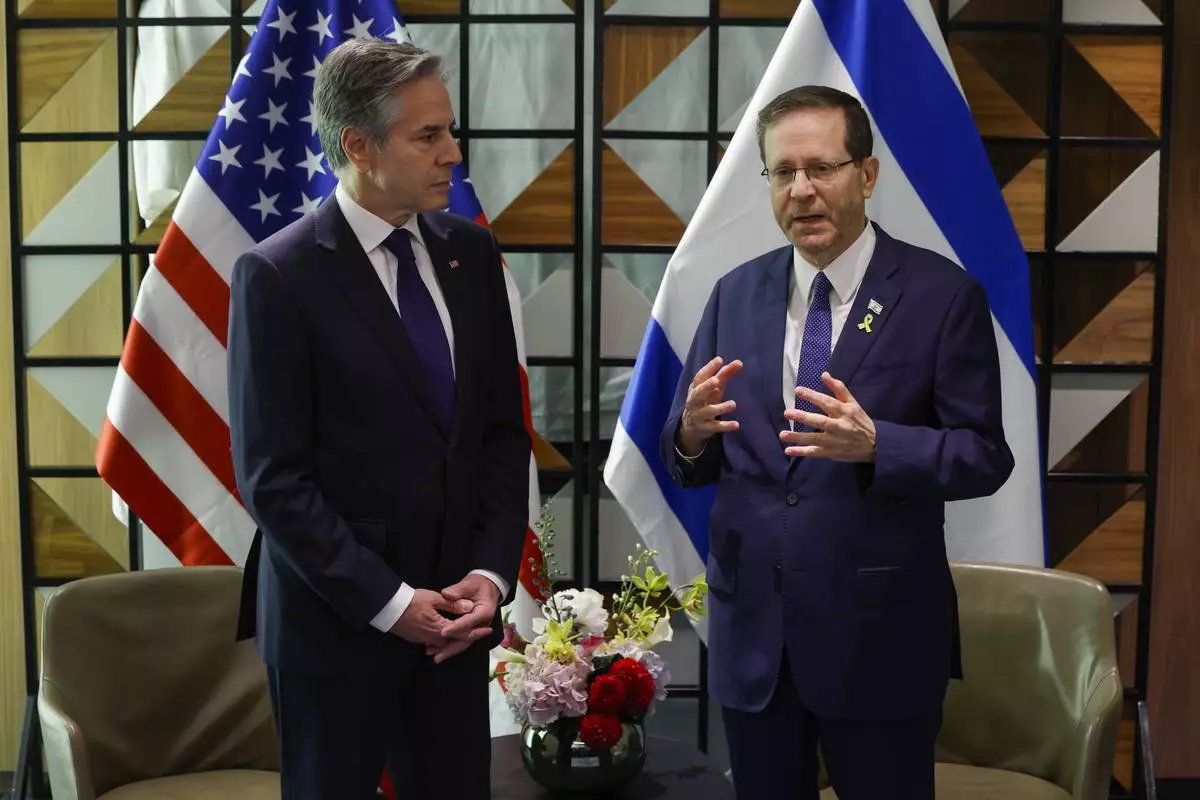
U.S. Secretary of State Antony Blinken, left, and Israeli President Isaac Herzog talk during their meeting in Tel Aviv, Israel, Wednesday, May 1, 2024. (Evelyn Hockstein/Pool Photo via AP)




